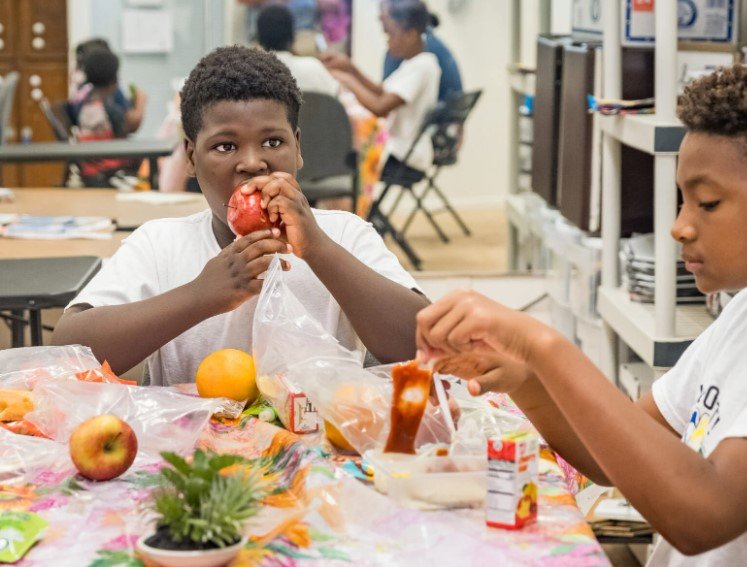As vacations begin for some, others are left hungry, unsupervised, and out of options
In Cornelia and Baldwin, Georgia, the sound of summer isn’t just splashing in the pool or church camp hymns. It’s also the growling of empty stomachs and the hum of laundromats doubling as food distribution sites.
For a growing number of children in these small towns, summer break doesn’t mean freedom — it means fewer meals, less structure, and more hours alone.
When School Closes, Support Systems Go With It
The school cafeteria does more than feed minds — it feeds bodies.
And when the doors close in May, families who rely on free or reduced-price lunches scramble to fill the gap. It’s a stressful time, especially in communities like Cornelia and Baldwin, where poverty rates exceed 25% and 30% respectively.
One volunteer with Food 4 Kids, a nonprofit that delivers meals to underserved children, described it plainly. “We’re not just handing out food. We’re giving kids something steady in a season that often isn’t.”
Their team recently handed out free lunches at Whispering Woods Coin Laundry, a location chosen because of its proximity to low-income housing. “We come where they already are,” she said. “Some kids walk here barefoot.”

The Unequal Summer
For kids with means, summer looks like swimming lessons, tennis clinics, and church retreats.
But for those without, it’s often long, hot days inside apartments without AC or in neighborhoods where it’s not safe to play outdoors. Many parents are working — sometimes two or three jobs — just to afford gas and groceries. That leaves young children alone for hours at a time.
One mother from Baldwin admitted she locks the door behind her when she heads out at 7 a.m. for work. “My daughter’s 10. I hate leaving her alone, but childcare? We can’t even afford rent sometimes.”
Her voice cracked. “We just do what we can.”
That “what we can” often includes patching together a mix of help from relatives, churches, and nonprofits. Still, it’s not enough. One pastor in Cornelia said he’s seen more kids showing up at their weekly free dinners than ever before.
By the Numbers: A County Under Pressure
A quick look at the numbers helps paint the picture:
| Area | % Living Below Poverty Line | State Median Income (GA): $71,355 |
|---|---|---|
| Cornelia | 26.4% | |
| Baldwin | 31.2% | |
| Habersham Co | ~18.7% |
These statistics are not just figures — they’re families. And with food prices up nearly 25% since 2020 and housing costs rising fast in rural Georgia, there’s little cushion for unexpected expenses or breaks in routine.
Not Just Food — It’s the Lack of Everything
Summer’s challenges don’t end at hunger.
• Lack of supervision means more accidents, injuries, and encounters with strangers.
• Unstructured time can lead to learning loss, especially for students already struggling.
• No transportation means no access to programs even if they’re available.
“It’s the transportation thing that really breaks us,” said a camp director from Clarkesville. “We offer scholarships, but if mom or dad can’t get off work or doesn’t have a car, that kid stays home.”
Some kids just disappear for weeks. Teachers often describe the first day back in August as heartbreaking. “You can see it in their faces — they haven’t been anywhere, they haven’t done anything, and they haven’t been fed enough.”
Community Tries, But the Gaps Are Real
Organizations are doing their part.
The Food 4 Kids team, backed by volunteers and donations, has doubled its summer routes. Churches have opened their doors for free movie nights, and some laundromats are letting groups set up snack tables outside. But with no coordinated county-wide plan, many efforts are patchwork.
Even well-meaning programs face hurdles. Insurance costs have risen. Volunteer pools have shrunk. Some initiatives that worked last year no longer have funding.
“I wish we could do more,” said the director of a small faith-based summer school. “We’re barely making payroll, but these kids — they need more than we can give.”
What Could Help, and What Might Actually Happen
So what’s the way forward?
That’s the million-dollar question. Local advocates point to a few things that could shift the needle:
• Transportation stipends for low-income families
• Expanded USDA summer food programs for rural towns
• Paid partnerships between schools and nonprofits during summer
• Incentives for local businesses to host youth-friendly events
But will those things happen? Maybe. Maybe not.
Some say the issue needs to get louder. “People think poverty is a city problem,” said one Cornelia council member. “They don’t realize that in small towns, it’s often right next door — you just don’t see it.”
For now, those handing out sandwiches in laundromat parking lots aren’t waiting on legislation. They’re just trying to get through another summer, one brown bag at a time.
